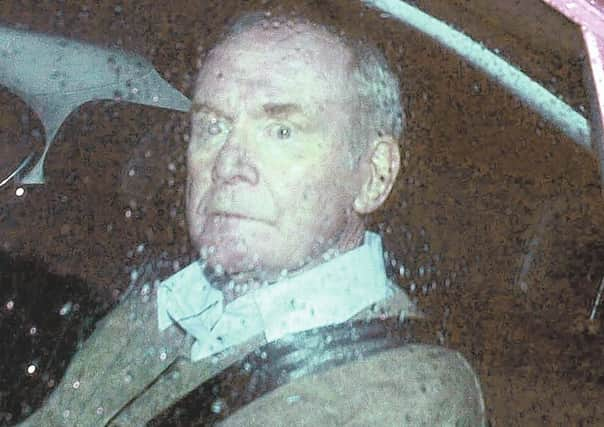Stormont collapse 12 months on: '˜This is IRA strategy by other means'


Lord Morrow, DUP chairman and a former Stormont minister, was speaking to the News Letter 12 months to the day since Martin McGuinness collapsed the Province’s government.
He was joined by ex-UUP leader Mike Nesbitt, who said that the sense of stalemate is so deep now that some unionists even feel a “nostalgia” for Mr McGuinness, because at least he had come to believe in the idea of having a functioning Northern Ireland Executive and Assembly.
Advertisement
Hide AdAdvertisement
Hide AdOn January 9 last year, Mr McGuinness announced his resignation as deputy first minister with “deep regret and reluctance”.
In his resignation letter, he cited the RHI debacle as being behind the move.
But he added that it came against a “backdrop” of the DUP’s failure to fully embrace “equality, mutual respect and all-Ireland approaches enshrined in the Good Friday Agreement”.
On March 21, he succumbed to ill-health and died.
Though he made no specific mention of an Irish language act in his resignation letter, it has come to be regarded as the dominant Sinn Fein demand for restoring power-sharing.
Advertisement
Hide AdAdvertisement
Hide AdSpeaking to the News Letter yesterday Lord Morrow – ex-Fermanagh and South Tyrone MLA and social development and communities minister – lamented what he said had been a “wasted year” filled with “lost opportunities” and “missed chances”.
He also feels Mr McGuinness had been “forced” to quit by “the hierarchy within republicanism [who] have lost the taste or appetite for governance in Northern Ireland”.
“I think they’d come to the stage in their strategy that they don’t want Northern Ireland to be seen to be a progressive, outward place, and a good place to do business,” he said.
“There was a message going across the world that Northern Ireland was working ... and that’s not the progressive message they wanted to get out.”
Advertisement
Hide AdAdvertisement
Hide AdAs to whether he believes this is a continuation of the IRA’s campaign to make the Province ungovernable, he said: “I do. I remember a very well known journalist from the BBC (who’s now out in foreign fields reporting), when the ceasefire happened, said to me: ‘What do you think about the ceasefire?’
“My answer was: ‘It’ll now be war by another means.’
“So this is the other means.”
Mike Nesbitt, leader of the UUP at the time Stormont collapsed, said in 2007 that the DUP and Sinn Fein had decided they would jointly run the government, but that a number of times since then they have shown they are “incapable of working together”.
He added that Sinn Fein in particular maybe realise the Province is facing a tough financial climate, and do not want to be seen to have their “fingerprints” on any spending cuts in the near future.
“It’s just odd that you have such powers lying on the table that nobody wants to lift,” he said.
Advertisement
Hide AdAdvertisement
Hide Ad“It’s counter-intuitive for politicians to have the offer of basically being able to run the health service, education system and all the rest, and just saying: thanks but no thanks.”
He sees “no sign” of a “mutual trust” being established allowing them to do business.
As to Lord Morrow’s belief that this impasse is “war by another means”, he said: “I can understand why people think it is ... I happen to think Martin McGuinness actually did have a desire to make Northern Ireland work.
“But a year on, you maybe look at Martin McGuinness as a bit of a one-off, in terms of his commitment to devolution.”
Advertisement
Hide AdAdvertisement
Hide AdHe added: “I know there are unionists who are now almost nostalgic about him. Not forgiving or forgetting his past in the IRA, but as a politician I know there are some who privately would say they miss McGuinness.”
He said these people were in both the UUP and DUP.
“They may be begrudging, but there’s still an acceptance that here was a man who appeared to be trying to make the institutions work. And that sense is currently not being felt.”
As for the outlook now, he said: “I think the outlook is bleak. Because if there is a deal it seems to me it’ll be done because it suits the self-interest of the big political parties.
“But it’ll be done without building the solid foundation of [a] working relationship that is the only hope of delivering better government – the sort of government we envisaged back in ‘98.”
Advertisement
Hide AdAdvertisement
Hide AdIn response, Sinn Fein said: “When Martin McGuinness resigned he made clear his reasons for doing so.
“As a result of the DUP’s ongoing denial of basic civil and human rights, allegations of corruption and financial impropriety, and continued disrespect, he made the decision to resign and end the DUP denial of rights in government.
“Mike Nesbitt and Maurice Morrow obviously refuse to accept Martin’s decision to take a stand on denial of rights, a stance overwhelmingly endorsed by the electorate in March and June last year.
“Public confidence cannot be restored in the Assembly until the British government and DUP implement outstanding political agreements, and end an ongoing blockade of rights.”